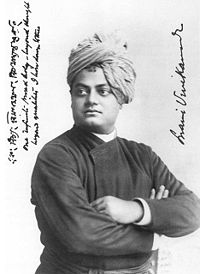50. तज्जस्संस्कारोऽन्यसंस्कार प्रतिबन्धी ॥५०॥
tajjas-saṁskāro-'nya-saṁskāra pratibandhī ||50||
We have seen in the foregoing aphorism that the only way of attaining to that super-consciousness is by concentration, and we have also seen that what hinder the mind from concentration are the past Samskaras, impressions. All of you have observed that when you are trying to concentrate your mind, your thoughts wander. When you are trying to think of God, that is the very time which all these Samskaras take to appear. At other times they are not so active, but when you want them not to be they are sure to be there, trying their best to crowd inside your mind. Why should that be so? Why should they be much more potent at the time of concentration? It is because you are repressing them and they react with all their force. At other times they do not react. How countless these old past impressions must be, all lodge somewhere in the Chitta, ready, waiting like tigers to jump up. These have to be suppressed that the one idea which we like may arise, to the exclusion of the others. Instead, they are all struggling to come up at the same time. These are the various powers of the Samskaras in hindering concentration of the mind, so this Samadhi which has just been given is the best to be practised, on account of its power of suppressing the Samskaras. The Samskara which will be raised by this sort of concentration will be so powerful that it will hinder the action of the others, and hold them in check.
51. तस्यापि निरोधे सर्वनिरोधान्निर्बीजः समाधिः ॥५१॥
tasyāpi nirodhe sarva-nirodhān-nirbījaḥ samādhiḥ ||51||
By the restraint of even this (impression, which obstructs all other impressions), all being restrained, comes the “seedless” Samadhi.
You remember that our goal is to perceive the Soul iself. We cannot perceive the Soul because it has got mingled up with nature, with the mind, with the body. The most ignorant man thinks his body is the Soul. The more learned man thinks his mind is the Soul, but both of these are mistaken. What makes the Soul get mingled up with all this, these different waves in the Chitta rise and cover the Soul, and we only are a little reflection of the Soul through these waves, so, if the wave be one of anger, we see the Soul as angry: “I am angry,” we say.
If the wave is a wave of love we see ourselves reflected in that wave, and say we are loving. If that wave is one of weakness, and the Soul is reflected in it, we think we are weak. These various ideas come from these impressions, these Samskaras covering the Soul. The real nature of the Soul is not perceived until all the waves have subsided; so, first, Patanjali teaches us the meaning of these waves; secondly, the best way to repress them; and thirdly, how to make one wave so strong as to suppress all other waves, fire eating fire as it were. When only one remains, it will be easy to suppress that also, and when that is gone, this Samadhi of concentration is called seedless; it leaves nothing, and the Soul is manifested just as It is, in Its own glory. Then alone we know that the Soul is not a compound, It is the only eternal simple in the universe, and, as such, It cannot be born, It cannot die, It is immortal, indestructible, the Ever-living Essence of intelligence.
 Swami Vivekananda
Swami Vivekananda
